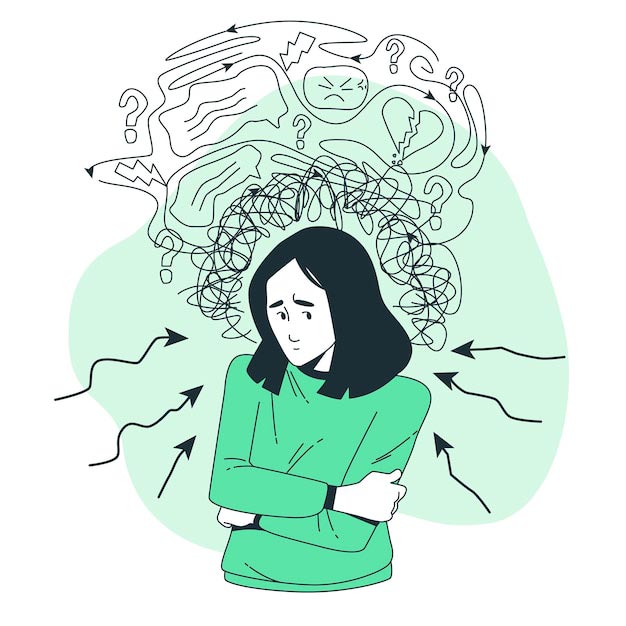
AYURVEDA AND ANXIETY
Share
Anxiety is a prevalent mental health condition that affects millions of people worldwide. It can be characterized by excessive worry, fear, and nervousness, often leading to physical symptoms like rapid heartbeat, sweating, and restlessness. In recent years, there has been an increased interest in complementary and alternative medicine, and Ayurveda, an ancient Indian system of medicine, has emerged as a potential holistic approach for managing anxiety. This paper explores the relationship between Ayurveda and anxiety, shedding light on the principles, practices, and treatments that Ayurveda offers to alleviate this mental health concern.
Ayurvedic Understanding of Anxiety:
Ayurveda, which translates to "the science of life," is founded on the principle that the mind and body are interconnected. According to Ayurvedic philosophy, imbalances in the three doshas – Vata, Pitta, and Kapha – disrupt the natural harmony of the mind and body, leading to various ailments, including anxiety. Anxiety is primarily associated with an imbalance in the Vata dosha, which governs the nervous system and regulates movement and thought processes.
Ayurvedic Practices for Anxiety:
Diet: Ayurveda emphasizes the significance of a balanced diet to maintain overall health, including mental well-being. Foods that are warm, grounding, and nourishing are recommended to pacify Vata dosha. Incorporating cooked vegetables, whole grains, warm herbal teas, and healthy oils like ghee can help soothe anxiety.
Meditation and Yoga: Mindfulness practices like meditation and yoga are integral components of Ayurveda for calming the mind and reducing anxiety. These practices help individuals develop awareness, promote relaxation, and enhance their ability to cope with stressors.
Herbal Remedies: Ayurveda offers a wide range of herbal remedies to address anxiety. Ashwagandha, Brahmi, and Jatamansi are some of the herbs used to support the nervous system, reduce stress, and improve overall mental well-being.
Abhyanga (Ayurvedic Massage): Abhyanga, an Ayurvedic oil massage, is believed to balance the doshas and promote relaxation. Regular massage with warm, soothing oils can help alleviate anxiety symptoms and induce a sense of calmness.
Lifestyle Modifications: Ayurveda encourages individuals to establish a daily routine (dinacharya) that includes consistent sleep patterns, regular exercise, and stress management techniques to maintain balance and reduce anxiety.
Integration with Modern Medicine:
While Ayurveda offers valuable insights and practices for managing anxiety, it is essential to acknowledge that severe anxiety disorders may require medical intervention, including psychotherapy or medication. Ayurveda can complement modern medical treatments and support overall well-being, but it should not be considered a replacement for evidence-based therapies.
The relationship between Ayurveda and anxiety lies in the holistic approach that Ayurveda takes towards mental health and overall well-being. By addressing the root causes of anxiety through lifestyle modifications, diet, herbal remedies, and mindfulness practices, Ayurveda offers a comprehensive approach to managing anxiety. However, individuals experiencing anxiety should consult with healthcare professionals to develop a personalized treatment plan that incorporates the best of both Ayurvedic and modern medical practices. Through an integrative approach, individuals can work towards achieving mental equilibrium and a better quality of life.
Ayurvedic Understanding of Anxiety:
Ayurveda, which translates to "the science of life," is founded on the principle that the mind and body are interconnected. According to Ayurvedic philosophy, imbalances in the three doshas – Vata, Pitta, and Kapha – disrupt the natural harmony of the mind and body, leading to various ailments, including anxiety. Anxiety is primarily associated with an imbalance in the Vata dosha, which governs the nervous system and regulates movement and thought processes.
Ayurvedic Practices for Anxiety:
Diet: Ayurveda emphasizes the significance of a balanced diet to maintain overall health, including mental well-being. Foods that are warm, grounding, and nourishing are recommended to pacify Vata dosha. Incorporating cooked vegetables, whole grains, warm herbal teas, and healthy oils like ghee can help soothe anxiety.
Meditation and Yoga: Mindfulness practices like meditation and yoga are integral components of Ayurveda for calming the mind and reducing anxiety. These practices help individuals develop awareness, promote relaxation, and enhance their ability to cope with stressors.
Herbal Remedies: Ayurveda offers a wide range of herbal remedies to address anxiety. Ashwagandha, Brahmi, and Jatamansi are some of the herbs used to support the nervous system, reduce stress, and improve overall mental well-being.
Abhyanga (Ayurvedic Massage): Abhyanga, an Ayurvedic oil massage, is believed to balance the doshas and promote relaxation. Regular massage with warm, soothing oils can help alleviate anxiety symptoms and induce a sense of calmness.
Lifestyle Modifications: Ayurveda encourages individuals to establish a daily routine (dinacharya) that includes consistent sleep patterns, regular exercise, and stress management techniques to maintain balance and reduce anxiety.
Integration with Modern Medicine:
While Ayurveda offers valuable insights and practices for managing anxiety, it is essential to acknowledge that severe anxiety disorders may require medical intervention, including psychotherapy or medication. Ayurveda can complement modern medical treatments and support overall well-being, but it should not be considered a replacement for evidence-based therapies.
The relationship between Ayurveda and anxiety lies in the holistic approach that Ayurveda takes towards mental health and overall well-being. By addressing the root causes of anxiety through lifestyle modifications, diet, herbal remedies, and mindfulness practices, Ayurveda offers a comprehensive approach to managing anxiety. However, individuals experiencing anxiety should consult with healthcare professionals to develop a personalized treatment plan that incorporates the best of both Ayurvedic and modern medical practices. Through an integrative approach, individuals can work towards achieving mental equilibrium and a better quality of life.
